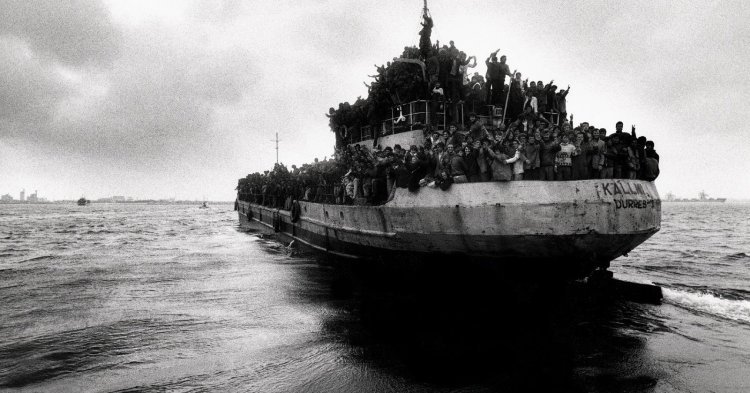Reports of tragedy on the waters separating Africa from Europe have become increasingly common, with almost daily examples appearing in European media. This rapid increase in immigration attempts has called to light the issue of Europe’s responsibility. What should the EU be doing about this? And is it Europe’s responsibility at all?
Those who have attempt the treacherous journey across the Mediterranean originate from many African and Middle-Eastern countries, ranging from Syria to Somalia. Although the identities of the victims are often unknown, reports from rescue missions suggest that a large number of those aboard the boats are children. It is common for illegal smuggling gangs in Libya in particular to charge migrants a fee in exchange for passage to Europe.
This surge in pressure for the EU to take action follows the epidemic of migrant deaths in the Mediterranean – an estimated 1,776 this year alone. This represents a 20-fold increase from in the same period last year. The loss of over 800 lives in the sinking of a migrant vessel last month brought the matter to the front pages, prompting an emergency summit of EU leaders in Brussels to discuss how to bring the situation under control.
What is being done?
European leaders have been accused by their public of not reacting appropriately to the humanitarian crisis.
Pledges to provide battleships and helicopters made by leaders such as David Cameron have been criticized as being attempts to merely deter potential migrants rather than attempt to solve the root cause of their problems. On top of this, Cameron and Italian PM Matteo Renzi have agreed that migrants who reach Europe will not necessarily qualify for asylum.
Comments from Australian PM, Tony Abbott, have attracted further condemnation from EU citizens, as his suggestion that Europe adopt the Australian-style policy of simply turning ships away were deemed to be promoting the idea of “fortress Europe”.
There have also been proposals for a compulsory fingerprinting system for all people arriving in Italy, Malta and Greece in order to make the repatriation process faster.
The emergency summit has also given rise to a pilot scheme whereby 5,000 migrants will be “shared” amongst member states. However, this policy has been described as “woefully inadequate” to cope with the estimated 30,000 migrants who will attempt the journey across the Mediterranean voyage before the end of the year.
These policies have been hurried by mounting pressure on leaders to address the problem.
What should be done?
The defensive stance taken by the emergency EU summit is a hastily-constructed solution to a complex problem. Whilst the heavily militarized response to Mediterranean migration is disappointing, questions are raised as to what long-term European policy should be.
One option is to increase border patrols on the Mediterranean. It is expected that the EU will double funding to Triton - the mission which patrols the border of Italy - in order to shorten the response time of rescue missions when vessels experience trouble. The success of this policy also hinges on the EU’s treatment of migrants after they reach land safely. If the opportunity to seek asylum remains as slim as it is at present, only half of the problem will have been addressed.
Another proposal – unpopular with the increasingly prevalent far right parties of Europe – is to grant asylum to all those who travel to European borders in search of a better life. This would not alleviate the dangers of the crossing, however, but it would ensure that migrants are not simply sent away when they eventually reach the shores. Despite financial turmoil, Europe is a wealthy continent and can afford uphold its core principles of human rights and solidarity and provide safety to those who ask for it.
A policy that would venture even deeper into the causes of the Mediterranean migration crisis has its bases at the root of the problem. Whilst guaranteed asylum and better rescue missions would help, they are measures that take effect only after migrants have left their home countries. It has been suggested that the EU has a responsibility as an institution which prides itself in valuing human rights to help to enforce them abroad. Intervention in states from which the migrants are fleeing, then, seems like an effective option.
Not renowned for its military might, the European Union is better placed to extend economic assistance to those in need. Often, migrants are forced to leave their homes and risk their lives at sea because of poor living standards, lack of opportunities or corrupt regimes. Through a system of grants, conditional loans and economic sanctions, the EU has the power to change this and remove the incentive for people to chance death on the Mediterranean.
This would have benefits, too, for Europe. With stronger economies outside our borders, trade between the Union and its neighbouring states looks to improve.
Changes like this would not happen over night. The causes of migrants’ dissatisfaction in their home countries is deep-rooted, and will require a lengthy process to change. In the meantime, the policies already proposed by the leaders’ summit will alleviate some of the troubles, but the tragedies will continue.
It is not certain what is to be done, but Europe certainly does have a responsibility.


Follow the comments: |
|
